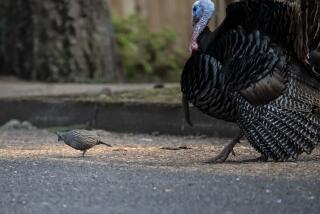Winging it for the birds
- Share via
When Chris Chester rescued a day-old sparrow that had fallen from a nest in an eave under his roof, it was the beginning of an improbable bond. Chester and his wife, who live in Portland, Ore., gradually turned over their lives and upstairs bedrooms (now screened off) to a motley collection of uncaged birds, plus whatever food-drawn vermin the couple either respected or waved off. With sparrows nestling into his neck and moths flitting by his face, Chester was impelled to write “Providence of a Sparrow,” a wonderfully literate, oddball meditation of life and the power of rich friendships with small birds.
In rescuing his first bird, simply named B, the 50-year-old electronics technician found a new life learning birdcalls and body language, creating inter-species games and savoring the joy of having a wild thing fly to his hand and fall asleep. Eight years with B and B’s found or purchased successors confirm that indoor life agrees with house sparrows, which live just one to three years in the wild.
Homey hints are gently folded into “Providence of a Sparrow.” For reviving and feeding featherless newborns, must-have components: shallow box, heating pad, toothpick, puppy food. “The trick,” Chester offers about inserting puppy food into a tiny beak, “is to roll the toothpick between thumb and forefinger while simultaneously rotating your wrist.” (This gets simpler once the chick begins to thrive, because it squawks for food all day -- making outside job demands burdensome, as they are with any baby.)
Rebecca, the technical writer and belly dancer Chester marries in the course of the book, is a ready partner in bird activities, bonding with a gimpy-legged rescuee (another sparrow) called Baby; the bird is unnerved when Rebecca showers and becomes testy when her sequined garb signals that she’s off to dance.
The introductory Shakespeare quotation, “There’s a special providence in the fall of a sparrow,” is followed in other chapters with lines from Whitman, Dickinson, Wilde and others. Chester obviously reads. And writes fluidly and informally, as if chatting with a friend in a sandwich place about the burgeoning family:
“Our intentions had been good when we acquired a finch, equally so when we bought a canary,” and “Baby is outside looking in, a habit he developed three years ago after he got his own room.”
Birds are assigned to rooms by personality -- sparrows jealous of one another are separated; otherwise Chester dare not show affection. Because sparrows look down on randy finches (which mate constantly), they can be in the same room without bothering to fight. On the other hand, finches get split up when the Chesters don’t want to be inundated with eggs: “One rolled off the ceiling fan motor and hit me on the head.”
Describing a sparrow’s exuberant song pattern and chirp vocabulary, Chester zooms in on the anatomy of its larynx, then returns to “Hit the Cap,” their bottle top game: “I’m amazed that I’ve never noticed before that B arcs to the left when he pounces on a cap. If he’s holding one in his beak and flicks it toward me, he does so right to left.”
Of keeping ants out of the garbage can he writes, “You’re thinking, ‘Why not simply wrap tape around the can and be done with it?’ ” In fact, he has no clue what we’re thinking, but that doesn’t stop him. Putting B’s thoughts into words, he takes the same tack: “I know what he’s thinking: ‘The old boy looks gruesome today; I’ll shove this string up his nose -- should make him right as rain.’ ” Guests, whom the birds don’t take to, are received downstairs, which has only the three cats (plus mice that steal from the cat dishes while the cats doze nearby).
The journal’s addictive undertow is akin to that of “Into Thin Air,” Jon Krakauer’s bestselling account of a doomed Mt. Everest excursion. Except that “Providence of a Sparrow” is funny and has insights like: “The cellar was littered with so many odds and ends from my father’s house that going down there felt like stepping into a cubist painting of my childhood.”
Not that this is everybody’s book. Chapters about ants, moths and mice are hard to stick with, as each species is invested with personality and purpose -- even a pathetic ficus tree, which, Chester writes, suffers indignities.
From the early-on mention (detailing B’s preflight body language) of “a quick evacuation to lighten the load,” you know that, though you may flinch from the subject of bird droppings, he won’t: “Typical house sparrow turds are slightly moist cylinders half an inch long that have no discernible scent unless sizzling on a lightbulb -- a process that smells like rancid liver frying in a skillet.”
While every aspect of the birds’ lives is scrutinized and deaths of Chester’s and Rebecca’s parents and the couple’s cats are carefully recounted, bird deaths are less meticulously examined. Selective absence of what Chester calls “mind-numbing detail” hints at his dread of inexpressible pain: “I fear B’s death as much as I fear anything.” Chester’s day job vanished when he took too much time off, so now he’s a writer. If that doesn’t fly, he’s got Rebecca’s adage, “Any day’s a good day when our birds are healthy and happy,” to which this lively, engaging book proves his commitment.
More to Read
Sign up for our Book Club newsletter
Get the latest news, events and more from the Los Angeles Times Book Club, and help us get L.A. reading and talking.
You may occasionally receive promotional content from the Los Angeles Times.










